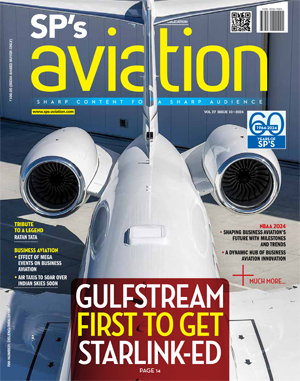INDIAN ARMED FORCES CHIEFS ON OUR RELENTLESS AND FOCUSED PUBLISHING EFFORTS

SP Guide Publications puts forth a well compiled articulation of issues, pursuits and accomplishments of the Indian Army, over the years

"Over the past 60 years, the growth of SP Guide Publications has mirrored the rising stature of Indian Navy. Its well-researched and informative magazines on Defence and Aerospace sector have served to shape an educated opinion of our military personnel, policy makers and the public alike. I wish SP's Publication team continued success, fair winds and following seas in all future endeavour!"

Since, its inception in 1964, SP Guide Publications has consistently demonstrated commitment to high-quality journalism in the aerospace and defence sectors, earning a well-deserved reputation as Asia's largest media house in this domain. I wish SP Guide Publications continued success in its pursuit of excellence.
Socked & Shaken

Hike in aviation turbine fuel prices has rattled the finances of airlines—already reeling under a cumulative loss of Rs 4,000 crore—into paroxysms of despair and despondency.
Frayed and straining under the weight of mounting Losses, the tight rope just turned perilously slippery for airlines in India. Hike in aviation turbine fuel (ATF) prices by 18.5 per cent as a fallout of rising international oil prices has plunged airline operators into a major crisis, pitching them up against a seemingly insurmountable hurdle that could pose a serious threat to their very survival.
Administered by government-owned oil companies, the bolt has rattled the finances of airlines—already reeling under a cumulative loss of Rs 4,000 crore—into paroxysms of despair and despondency. In the emerging scenario, business models, especially of low cost carriers, run the risk of being rendered irreversibly unviable. Worse, if one were to consider the signals emanating from the Organization of the Petroleum Exporting Countries (OPEC), it may not be possible to curb the price surge through enhanced global production. The possibility of significant reduction in levies by the central and state governments also appears remote, leaving the airlines with no option but to pass on the burden to the customer. Travellers are, in fact, already experiencing the aftershocks with fares rising meteorically and low cost air travel receding rapidly into the annals of aviation history.
Dismantling of the Administered Pricing Mechanism and the entry of a few private players some years ago notwithstanding, the government continues to dictate price and taxation levels. Through its public sector oil companies, the government still controls the market with near monopoly in the areas of import of crude, refining and marketing. Price levels of finished products within the country are not exposed to market forces.





